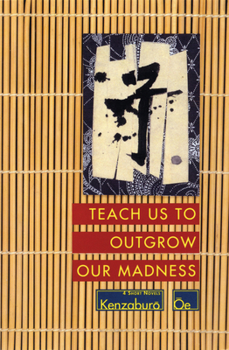Teach Us to Outgrow Our Madness: Four Short Novels: The Day He Himself Shall Wipe My Tears Away, Prize Stock, Teach Us to Outgrow Our
Select Format
Select Condition 
Book Overview
These four novels display Oe's passionate and original vision. Oe was ten when American jeeps first drove into the mountain village where he lived, and his literary work reveals the tension and ambiguity forged by the collapse of values of his childhood on the one hand and the confrontation with American writers on the other. The earliest of his novels included here, Prize Stock, reveals the strange relationship between a Japanese boy and a captured black American pilot in a Japanese village. Teach Us to Outgrow Our Madness tells of the close relationship between an outlandishly fat father and his mentally defective son, Eeyore. Aghwee the Sky Monster is about a young man's first job -- chaperoning a banker's son who is haunted by the ghost of a baby in a white nightgown. The Day He Himself Shall Wipe My Tears Away is the longest piece in this collection and Oe's most disturbing work to date. The narrator lies in a hospital bed waiting to die of a liver cancer that he has probably imagined, wearing a pair of underwater goggles covered with dark cellophane.
Format:Paperback
Language:English
ISBN:080215185X
ISBN13:9780802151858
Release Date:October 1994
Publisher:Grove Press
Length:261 Pages
Weight:0.78 lbs.
Dimensions:0.8" x 5.5" x 8.2"
Customer Reviews
4 ratings
This is why he won the Nobel Prize
Published by Thriftbooks.com User , 16 years ago
Oe's giant stature as a writer is demonstrated here more than in any other of his books. All these stories are wonderful, but "The Day He Himself Shall Wipe My Tears Away" is one of the greatest works of fiction I've ever read. I mean that. Buy this book and read it. You won't be sorry.
seminal!!
Published by Thriftbooks.com User , 20 years ago
I adore this book... I read it all at once, woke up my parents in the middle of the night talking about its descriptions of the sky, talked about it at my college interviews, which were about three years ago... Loved it. But Discovered that some of Oe's other work isn't as good. But wow! The language, plot, the strangeness, the beauty, inventiveness, and reach of the book is tremendous. :)
Imaginative, raw, every word pulls you into his world.
Published by Thriftbooks.com User , 26 years ago
Kenzaburo Oe was introduced to myself less than a year ago and since that time I regard him as my favorite writer. He has a tragic history in life and he portrays the reality of his pain so deeply within his stories. Yet, his writing is far from depressing. His imagination is on a far different level than any other writer I have run into. He writes what most are afraid to hear or describe. His prose is incredibly poetic, concise, and he leaves no room for candy coated happy endings. Everything he writes is real and I feel comes from deep in his soul. If you want to read about real life read Oe. His work flows like a story from Gabriel Garcia Marquez, but includes a darker side. I find myself reading Oe over and over again I hope I have sparked someone else's interest.
last three stories are better that the first
Published by Thriftbooks.com User , 26 years ago
I did not like the abstract nature of the first story, the unresolved plot elements like whether the main character has cancer or not and who the "chief executor is", nor the jumping between the past of WWII Japan and present of a hospital room with a man wearing green goggles. Why? The second story was more engaging and linear. I especially liked the depiction of the Black soldier as a gentle monster. It is a bit disturbing that the children could not relate to him as a human at any point of the story; maybe I'm sensitive because I'm Black. The title story was somewhat abstract, but still accessible and I liked the honesty of the depiction of the main character. A father comes to grips with the fact that he is being over protective of his mentally retarded child. Some of the metaphors were based on Japanese culture (eg. The smell of particular animals or farm implements), but overall an entertaining work. The last story was my favorite and deals with a character dealing (or resolving) the loss (murder?) of his child. Oe's prose is simple, but detailed; economical. I did not feel that any words were wasted in relating these stories and there is an originality to the plots that also make his work interesting. The second story was more engaging and linear. I liked it especially the depiction of the Black soldier as a gentle monster. It is a bit disturbing that the children could not relate to him as a human at any point of the novella; maybe I'm sensitive because I'm Black. The third story (the title story) was somewhat abstract, but still accessible and I liked the honesty of the depiction of the main character. Some of the metaphors were based on Japanese culture (eg. The smell of particular animals or farm implements), but overall an entertaining work. The last novella was my favorite and deals with a character dealing (or resolving) the loss (murder?) of his child. Oe's prose is simple, but detailed; economical. I did not feel that any words were wasted in relating these stories and there is an originality to the plots that also make his work interesting.





